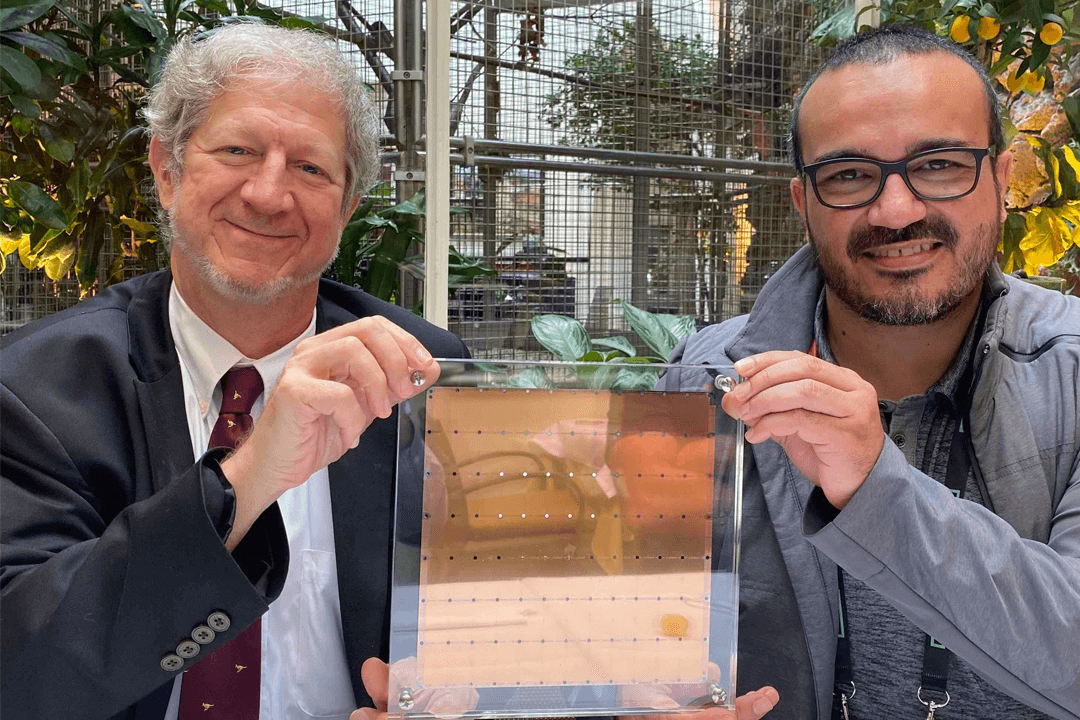KAUST delivers supercomputing breakthrough in multi-dimensional seismic processing

David Keyes (left) and Hatem Ltaief holding a wafer-scale engine manufactured by Cerebras
KAUST and Cerebras Systems, a pioneer in accelerating generative AI, based in the United States, have collaborated on seismic processing using the Condor Galaxy AI supercomputer, built by Cerebras and their strategic partner G42 out of Abu Dhabi, earning them a spot as finalists for the esteemed 2023 Gordon Bell Prize.
The Gordon Bell Prize is a prestigious award named after Gordon Bell, a pioneer in the field of computer science and high-performance computing. The prize, in its 35th year, is awarded annually to recognize outstanding achievements in the field of high-performance computing (HPC).
The groundbreaking research by KAUST and Cerebras revolves around multi-dimensional seismic processing, a discipline vital for understanding Earth's resources and steering the world toward a sustainable, low-carbon future. This innovative collaboration harnessed the power of Cerebras' cutting-edge technology to deliver seismic processing at speeds and accuracy levels previously considered unattainable.
Key to this achievement was the development of a Tile Low-Rank Matrix-Vector Multiplication (TLR-MVM) kernel, uniquely tailored to exploit the advanced architecture of Cerebras CS-2 systems within the Condor Galaxy AI supercomputer. The result was a seismic processing solution that reached production-grade accuracy with a record sustained memory bandwidth of 92.58 petabytes per second (PB/s). This achievement underscores the transformative potential of AI-customized architectures in ushering in a new era of seismic algorithms.
Andrew Feldman, the co-founder and CEO of Cerebras Systems, expressed his pride in this groundbreaking collaboration, stating, "In partnership with KAUST researchers and using the Condor Galaxy AI supercomputer, we are honored to be recognized by Gordon Bell for setting a new record in what is possible for multi-dimensional seismic processing. This work will unlock world-changing advancements across climate and weather modeling, computational astronomy, wireless communication, seismic imaging, and more."
Hatem Ltaief, Principal Research Scientist of KAUST's Extreme Computing Research Center (ECRC), who led the project from the KAUST side, expressed his excitement with the research achievement: "Disaggregated memory requires fine-grained algorithmic innovations. Working with Cerebras engineers to deploy them and extract the hardware's full potential was a dream."
ECRC Director David Keyes added, “It is exciting to discover the versatility of wafer-scale hardware beyond neural network training for which it was conceived and optimized. We join other examples of such architectural crossover in Gordon Bell Prize history.”
Other KAUST co-investigators include Professor Matteo Ravasi of Earth and Environmental Sciences and Engineering and 2023 KAUST Computer Science Ph.D. graduate Yuxi Hong, who now works at the Lawrence Berkeley National Laboratory.
More information on this multi-dimensional seismic processing workload can be found at https://repository.kaust.edu.sa/handle/10754/694388. This research was made possible by G42’s grant of system time on the Condor Galaxy 1 AI supercomputer.

